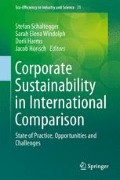Abstract
In Hungary the culture for sustainability management is quite diverse. Even large companies are usually subsidiaries or suppliers to large multinational companies and the influence of buyers and owners is substantial. As a result there are a number of different traditions in sustainability management in the country and correspondingly relatively few typical cultural attributes. The impacts of investors and shareholders are given high scores in the survey, while consumers are given a low score in motivating companies to pursue sustainability management. Community also has little influence because community involvement in sustainability management does not have a long tradition in Hungary. Thus two-way communication and participative methods of stakeholder management are less common. The responses show that Hungarian companies manage most environmental issues, especially emissions, more closely than the international average. Sustainability management tools are broadly known and applied in the country, and the general satisfaction with the number and level of tools indicates that there is no need for further development here. Basically, Hungarian companies are more sceptical towards the benefits of the implementation of corporate sustainability. This is especially true with regard to the prospective positive impacts on cost reduction, innovation, employee motivation as well as enhancing and safeguarding corporate reputation. In sum, Hungarian companies have already demonstrated expertise in most fields of sustainability management, but the development of a more participative collaboration with both internal and external stakeholders in sustainability management is still needed.
Access this chapter
Tax calculation will be finalised at checkout
Purchases are for personal use only
Notes
- 1.
According to the information released on the homepages of the companies listed by the Hungarian-Japanese Economic Club.
- 2.
Act XC of 2003, approved by the Hungarian Parliament on November 10, 2003, established the Research and Technological Innovation Fund, which provides stable and reliable financing for RTDI activities (http://www.nih.gov.hu/english/hungarian-innovation-act/overview-of-the-research).
References
Bai C, Sarkis J (2010) Green supplier development: analytical evaluation using rough set theory. J Clean Prod 18(12):1200–1210
Boda G, Kállay L, Stocker M (2010) Versenyszféra teljesítményéről nemzetközi összehasonlításban TM 102. sz. Műhelytanulmány BCE Vállatgazdaságtan Intézet Budapest 2010. http://edok.lib.uni-corvinus.hu/465/1/TM102_Boda__Kallay_Stocker.pdf. Accessed 10 Nov 2013
Bodorkós B, Pataki G (2009) Local communities empowered to plan? Action Res 7(3):313–334
Csutora M, Harangozó G (2009) European Sustainability Reporting Association report for Hungary, 2008. Műhelytanulmány. ESRA, London. http://www.sustainablereporting.eu/hungary. Accessed 09 Sept 2013
Csutora M, Kerekes S, Harangozó G, Németh P, Zsóka A (2006) Befolyásunk a vállalatok környezetvédelmi magatartására. In: Kerekes S (ed) Környezeti Nézőpontok. Budapesti Corvinus Egyetem, Budapest
Gelei A (2003) Competitiveness: a match between value drivers and competencies in the Hungarian automotive supply chain. IFPSM Summer School Publications. http://ifpsm.org/index.php/pub/summer-school-2003-2004-publications/. Accessed 09 Nov 2013
Harangozó G, Kerekes S, Zsóka Á (2010) Environmental management practices in the manufacturing sector? Hungarian features in international comparison. J East Eur Manag Stud 4:312–347
Kerekes S, Harangozó G, Zsóka Á, Németh P (2003) Environmental policy tools and firm-level management practices, OECD National Report: Hungary. Kutatási jelentés. BCE, Környezetgazdaságtani és Technológiai Tanszék, Budapest
Kerekes S, Wetzker K, Csutora M, Harangozó G, Szőnyi L (2006) Electrolux Lehel – more than a profitable enterprise Budapest-Jászberény. http://www.environmentalmanager.org/wp-content/uploads/2008/04/electroluxcorvinuseangol1.pdf. Accessed 10 Nov 2013
Klauber M (2008) A járműipari ágazati stratégia kialakítását megalapozó szakmai átvilágító tanulmány. KOPINT-TÁRKI, Budapest
KSH (Hungarian Statistical Office) (2013) Magyar Statisztikai Évkönyv 2012. Budapest
Magerholm Fet A, Zilahy G (2011) A környezetbarát beszerzés gyakorlata Norvégiában és Magyarországon. In: Csutora M, Hofmeister TÁ (eds) Fenntartható fogyasztás? A fenntartható fogyasztás gazdasági kérdései. Budapesti Corvinus Egyetem, Budapest, pp 110–124
Ministry of Rural Development (2013) EMAS register. http://emas.kvvm.hu/company.php?l=. Accessed 20 July 2013
Nagy B (2005) Nők a vezetésben. In: Nagy I, Pongrácz T, Tóth IG (eds) Szerepváltozások. Jelentés a nők és férfiak helyzetéről. TÁRKI, Ifjúsági, Családügyi, Szociális és Esélyegyenlőségi Minisztérium, Budapest, pp 44–56
Schaltegger S, Lüdeke-Freund F, Hansen E (2012) Business cases for sustainability. The role of business model innovation for corporate sustainability. Int J Innov Sustainable Dev 6(2):95–119
Schaltegger S, Harms D, Hörisch J, Windolph SE, Burritt R, Carter A, Truran S, Crutzen N, Ben Rhouma A, Csutora M, Tabi A, Kokubu K, Kitada H, Haider MB, Kim J-D, Lee K-H, Moneva JM, Ortas E, Álvarez-Etxeberria I, Daub C-H, Schmidt J, Herzig C, Morelli J (2013) International corporate sustainability barometer: a comparative study of 11 countries. Centre for Sustainability Management, Lüneburg
Szechy A (2012) Determinants of environmental innovation in the Hungarian chemicals sector. Interdiscip Environ Rev 13(2/3):139–157
Tóth G (1999) ISO 14001 speedometer – offers fresh look at the certification derby. Bus Environ X(8):3–5
Tóth G (2003) Evaluation of environmental performance of companies. Soc Economy 25(3):383–402
Author information
Authors and Affiliations
Corresponding author
Editor information
Editors and Affiliations
Rights and permissions
Copyright information
© 2014 Springer International Publishing Switzerland
About this chapter
Cite this chapter
Csutora, M., Kerekes, S., Tabi, A. (2014). Sustainability Management in Hungary. In: Schaltegger, S., Windolph, S., Harms, D., Hörisch, J. (eds) Corporate Sustainability in International Comparison. Eco-Efficiency in Industry and Science, vol 31. Springer, Cham. https://doi.org/10.1007/978-3-319-06227-3_8
Download citation
DOI: https://doi.org/10.1007/978-3-319-06227-3_8
Published:
Publisher Name: Springer, Cham
Print ISBN: 978-3-319-06226-6
Online ISBN: 978-3-319-06227-3
eBook Packages: Earth and Environmental ScienceEarth and Environmental Science (R0)

